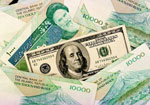 Bloomberg: Decades after Ayatollah Ruhollah Khomeini dismissed it as an asinine matter following the Islamic Revolution in 1979, fixing the worst economy in about 20 years tops the list of issues voters in tomorrow’s election say they care about, according to the Iranian Students Polling Agency.
Bloomberg: Decades after Ayatollah Ruhollah Khomeini dismissed it as an asinine matter following the Islamic Revolution in 1979, fixing the worst economy in about 20 years tops the list of issues voters in tomorrow’s election say they care about, according to the Iranian Students Polling Agency.
Bloomberg
By Alaa Shahine
 Iran’s next president is about to find out that economics is not just for donkeys after all.
Iran’s next president is about to find out that economics is not just for donkeys after all.
Decades after Ayatollah Ruhollah Khomeini dismissed it as an asinine matter following the Islamic Revolution in 1979, fixing the worst economy in about 20 years tops the list of issues voters in tomorrow’s election say they care about, according to the Iranian Students Polling Agency.
“Every eight years a new president came, but it didn’t change our situation,” said Mahbobeh Hakimi, 38, who lives in Shohada Square, a low-income area in the capital Tehran. “I can’t buy milk for my teenage daughter.”
Hurt by U.S. and European sanctions that triggered a currency crisis, Iran’s gross domestic product is set to shrink for a second year in 2013 while inflation will stay near the highest level since 1995, the International Monetary Fund estimates. The new political chief will need to seek the authority to turn the economy around from Khomeini’s successor, Supreme Leader Ayatollah Ali Khamenei, while halting the deterioration in foreign relations over Iran’s nuclear program.
“There are two clocks ticking,” said Cliff Kupchan, Iran analyst at Eurasia Group in Washington. “There’s the nuclear clock, or when will Iran get nuclear weapons capability, and also an indigenous unrest clock: when will the economy get so bad Iranians can’t take it and they go to the streets?”
Watermelon Prices
While declaring economics was “for donkeys,” the late Khomeini told Iranians that the revolution wasn’t about “the price of watermelon,” according to citations from his speech.
The remaining six candidates in tomorrow’s election have shifted focus, promising voters to revive the economy and stabilize the exchange rate, blaming the crisis on outgoing President Mahmoud Ahmadinejad, who is barred by the country’s constitution from seeking a third four-year term.
The rial has lost more than two thirds of its value in the past two years as of April 30, according to the U.S. Treasury. Inflation in April was 32 percent, and a quarter of all Iranians aged 15 to 29 were unemployed in the last Iranian year ending March 20, official figures show.
Talks and intensified sanctions meanwhile failed to press Iran to abandon its nuclear program, which officials in the Islamic republic say is designed for peaceful purposes.
Security Crackdown
Unrest for now remains unlikely amid a security crackdown on opposition leaders, Jamie Ingram, an analyst at research firm IHS, said in a report released yesterday. The economy at the same time will post a current account surplus this year and in 2014, according to IMF estimates.
“Economies can survive for a very long time,” Emad Mostaque, London-based strategist at Noah Capital Markets, said in an interview in Dubai yesterday. “They have developed self-sustaining infrastructure.”
In an attempt to boost his popularity among the poor, Ahmadinejad, 56, provided subsidized loans. That ultimately hurt the economy because it forced banks into “almost guaranteed loss positions,” according to Edward Bell, a London-based analyst at the Economist Intelligence Unit.
“Those are issues that the central bank and the new government could have control over,” he said on June 10. Inflation is “probably a bigger challenge because of the significant pressure on prices of anything that’s imported.”
The Islamic republic is paying premiums of as much as 15 percent to secure food and animal feed from India as sanctions curb supplies of essential commodities. Iranian importers paid as much as $119 a metric ton more for Indian basmati rice compared with other buyers in the 11 months through February, according to India’s Commerce Ministry.
More Sanctions
It may get worse. The U.S. is set to impose fresh penalties from July 1 to make the Iranian currency useless in global commerce. That involves sanctions against foreign banks that exchange rials, according to the U.S. Treasury Department.
A “significant” deterioration risks sparking a broader-based opposition to the regime than the protests that followed the 2009 election, said Bell. He estimates GDP will shrink by as much as 2 percent this year after a contraction of about 3 percent in 2012.
“For the next several years we expect Iran’s economy to be smaller than it was in 2011,” he said. “So while we might have a growth rate in, say 2015, overall the economy is still at a much more reduced size than a few years ago.”
Some young Iranians have said that they had no plans to vote, even as Khamenei urges high turnout, after the suppression of the opposition following the last vote. Protesters accused authorities at the time of using ballot fraud to deny a reformist candidate victory.
While Iran isn’t “at a boiling point,” the worsening economy will put more pressure on the regime, said Kupchan of Eurasia Group. “I don’t think the ship could be turned around without sanctions relief,” he said.


